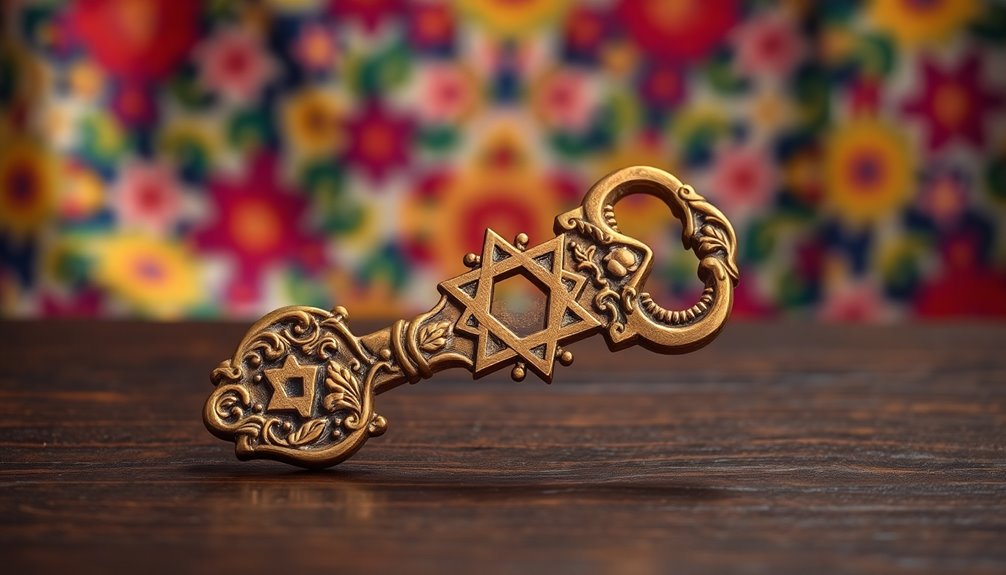The Key of David symbolizes divine authority and access to God's presence. In scriptures like Revelation 3:7 and Isaiah 22:22, it connects to Jesus' kingship and the fulfillment of the Davidic Covenant. This key isn't just a literal object; it represents spiritual governance and the believer's responsibility to align with God's will. It guides your daily choices, encouraging acts of kindness and community service. Understanding its significance can transform how you view leadership and decision-making. If you're curious about how this concept applies further to your faith journey, there's so much more to explore.
Key Takeaways
- The Key of David symbolizes spiritual authority and access to God's presence, as referenced in Revelation 3:7.
- It represents the fulfillment of the Davidic Covenant, affirming Jesus' reign as King.
- The Key serves as a guide for aligning personal decisions with God's will and kingdom values.
- Community service inspired by the Key emphasizes stewardship, compassion, and faith in action.
- Resources like "Israel and the Church" and Logos Bible Software provide deeper insights into the Key's significance.
Introduction

The Key of David serves as a powerful biblical symbol that connects you to the themes of authority and divine control. Mentioned in Revelation 3:7 and Isaiah 22:22, this key represents the authority over David's kingdom, particularly Jerusalem. It signifies the fulfillment of the Davidic Covenant, with Jesus holding this key, highlighting His role as the King of kings and Lord of lords.
Understanding the Key of David unlocks insights into Christ's rulership and the establishment of divine authority within the New Jerusalem and the kingdom of heaven. For you, this concept is vital as you prepare for Christ's Second Coming, revealing the ultimate rewards for supporting God's Work. The key emphasizes Jesus' victories over death and hell, paralleling the historical context of David's reign and the stronghold of Zion.
As you delve deeper into this symbol, you'll recognize its significance within the Church, offering guidance and hope for believers. The Key of David invites you to explore the layers of divine authority that empower your faith and understanding as you navigate your spiritual journey.
Biblical Texts Overview

In this section, you'll explore the primary and secondary Bible references that highlight the significance of the Key of David.
These texts not only illustrate Jesus' authority but also connect to the broader themes of the Davidic Covenant.
Understanding these passages will deepen your insight into the spiritual and prophetic meanings behind this powerful symbol.
Primary Bible References
Throughout Scripture, the Key of David emerges as a powerful symbol of authority and access granted by God. In Revelation 3:7, this key represents the authority given to the church in Philadelphia by Jesus, highlighting His role in opening doors that no one can shut.
You also see this concept in Isaiah 22:22, where Eliakim is entrusted with the Key of David, governing the house of David and illustrating divine authority.
Jesus fulfills the Davidic Covenant, affirming His kingship and reign over Jerusalem and the kingdom of heaven. In Revelation 1:18, Jesus holds the keys of Hades and Death, paralleling the authority represented by the Key of David, especially regarding His resurrection and dominion over death.
Furthermore, in Matthew 16:19, the authority conferred by the Key of David extends to Jesus granting the keys of the kingdom of heaven to His followers.
This signifies your role in God's kingdom and accentuates the importance of the Key of David as not only a symbol of authority but also of the access and responsibilities you hold as part of the divine plan.
Secondary Bible References
While exploring the concept of the Key of David, it's essential to recognize its broader biblical context through various secondary references. In Isaiah 22:22, the Key of David symbolizes divine authority, as Eliakim is appointed to govern the house of David. This link highlights how authority is passed down, ultimately connecting to Jesus, who holds the ultimate authority over His church, as seen in Revelation 3:7. Gerald Flurry emphasizes this connection within the Church of God, illustrating how Jesus' lineage from David gives Him the right to this key.
Moreover, Matthew 16:19 showcases Jesus granting His followers keys to the kingdom of heaven, empowering them in spiritual matters and demonstrating the importance of their role in the divine governance of God's kingdom.
Revelation 1:18 reinforces this theme, depicting Jesus as holding the keys of Hades and Death, showcasing His power over the grave and further establishing His authority.
The historical context found in 2 Samuel 5:1-5, where David's reign begins, enriches the understanding of the Key of David and its significance throughout scripture, highlighting the continuity of divine governance from David to Christ.
Ancient Israelite Monarchy Practices

The ancient Israelite monarchy was a unique blend of religious and political authority, with kings serving as both leaders and spiritual figures. Established with Saul as the first king, the monarchy gained momentum under David, who united the tribes and made Jerusalem the capital. The anointing of kings by prophets, like Samuel's anointing of David, symbolized their divine selection, positioning them as God's appointed rulers.
Operating under a theocratic system, the monarchy emphasized that the king was responsible for upholding divine laws while leading the people in worship. This dual role meant that kings had to be both just and pious, ensuring that their governance aligned with spiritual principles.
Succession typically followed a patrilineal line, with sons inheriting the throne, although conflicts, like the one between David and Absalom, occasionally arose due to rival claims.
Moreover, the King of Israel wielded significant military and judicial authority, often leading armies into battle and making critical legal decisions. This centralized governance was essential in maintaining stability and order in ancient Israel, ensuring the monarchy's role as both a political and spiritual cornerstone of society.
Symbolism of the Key

In understanding the symbolism of the Key of David, one can see it represents authority and control, particularly in relation to Jesus' kingship. This key is a powerful emblem of access and power, especially for the Philadelphia Church, as referenced in Revelation 3:7. Here, it signifies the church's unique position, granted the authority to enter the very presence of God, much like Eliakim did in Isaiah 22:22 regarding the house of David.
The Key of David not only pertains to the authority over David's domain but also connects to the broader promise of Jesus as King of kings and Lord of lords. Its significance extends beyond ancient times to the New Jerusalem, where believers share in the governance of God's kingdom. This connection reinforces the spiritual inheritance awaiting those who support God's Work.
As you explore this symbolism, consider how a television program might illustrate these themes, emphasizing the significance of the City of David and its role in biblical prophecy.
Understanding the key's meaning enriches your appreciation of Jesus' fulfillment of the Davidic Covenant and the authority bestowed upon His followers.
Misunderstanding Its Historical Context

You might think the Key of David is just a spiritual symbol, but that misses its rich historical roots.
Understanding its context in ancient Israel highlights how it represented real political authority and governance.
Debunking Common Misconceptions
Understanding the Key of David often requires unpacking a range of misconceptions tied to its historical context. Many people mistakenly believe that the Key of David is merely a physical object. In reality, it symbolizes the spiritual authority held by Jesus, emphasizing His fulfillment of the Davidic Covenant and role as the Messiah.
Another common misunderstanding involves genealogical claims, where individuals think that lineage determines authority in God's kingdom. However, biblical teachings clarify that salvation and authority are rooted solely in faith in Jesus, not heritage.
You might also encounter the association of the Key of David with Anglo-Israelism. This belief is unfounded and distorts the intended message of unity and authority in Christ.
Moreover, it's crucial to recognize that the historical context of the Key of David signifies more than control; it embodies the promise of divine governance. This extends beyond David's reign, pointing to the future rulership of the New Jerusalem.
Cultural Relevance in Modern Times
Misinterpretations of the Key of David can lead to significant misunderstandings in modern Christianity, particularly regarding its cultural relevance today. Many people view the Key as a literal object rather than recognizing it as a metaphor for spiritual authority rooted in biblical texts like Revelation 3:7 and Isaiah 22:22. This misunderstanding can distort the true meaning, shifting focus away from Jesus Christ's rulership and the fulfillment of messianic prophecies.
Gerald Flurry's interpretation exemplifies this issue, promoting a cultic understanding that emphasizes lineage claims without biblical support. Such interpretations can mislead contemporary believers, diverting attention from the essence of faith in Jesus as the means of salvation.
Additionally, the cultural relevance of the Key often manifests in claims of special insights or authority, which can undermine the core message of divine authority and Christ's eternal kingship.
If you're unaware of the true theological implications, you may overlook the significance of the Key of David, which centers on spiritual governance rather than human interpretations of power. Understanding its historical context is crucial for grasping its implications for spiritual leadership today.
Daily Decision-Making Guidance

When you face daily decisions, remember that the Key of David can guide you toward choices that align with God's will.
Consider how your actions, whether in personal life or community service initiatives, reflect the values of His kingdom.
Daily Life Choices
How do daily life choices shape your faith journey? Each decision you make can either strengthen or weaken your commitment to living out your faith. By seeking wisdom and understanding through prayer and reflection on Scripture, as James 1:5 suggests, you open yourself to divine guidance that informs your choices.
Prioritizing acts of kindness and service, in line with Matthew 5:16, allows your light to shine brightly in the world, demonstrating your faith in action.
Consider the long-term implications of your daily choices. Galatians 6:7 reminds you that what you sow, you'll reap, emphasizing the importance of thoughtful decision-making. Regular self-examination and accountability within your faith community, as Proverbs 27:17 highlights, can help you align your choices with God's purposes.
Incorporating biblical principles into your daily decisions fosters a lifestyle that honors God. Colossians 3:23 encourages you to work heartily for the Lord in all you do. Each choice becomes an opportunity to reflect the values of the Kingdom, ultimately shaping your faith journey and drawing you closer to God's heart.
Community Service Initiatives
Daily life choices often lead to opportunities for community service, where faith and action intersect. Engaging in community service initiatives allows you to align your actions with the core values of the Key of David, emphasizing service, authority, and responsibility.
Organizations inspired by this principle encourage you to actively participate in volunteer work, fostering unity and collaboration to address local needs.
When making decisions about community service, consider using a framework that includes prayer, scripture consultation, and seeking guidance from church leaders. This ensures that your efforts align with God's purpose and the teachings of the Key of David.
Many programs focus on outreach efforts like food drives, educational initiatives, and support for the underprivileged, reflecting the principles of stewardship and compassion.
Key's Significance in Leadership

Understanding the Key of David is crucial for grasping its significance in leadership, as it represents both divine authority and the responsibilities bestowed upon believers. The Key of David symbolizes ultimate authority and control over the Davidic kingdom, as highlighted in Revelation 3:7 and Isaiah 22:22.
When you recognize that Jesus holds this key, it becomes clear that He not only fulfills the Davidic Covenant but also reigns over the New Jerusalem and the kingdom of heaven.
This key signifies Jesus' sovereign authority and the promise of future leadership roles for you as a believer; you'll reign with Him one day. Understanding this significance enables you to appreciate the spiritual implications of your responsibilities as a king and priest under Christ's authority.
The key's role in leadership also emphasizes the necessity of faith and obedience to God's will. By aligning your actions with His purpose, you unlock your potential to influence and expand His kingdom.
Embracing the Key of David motivates you to lead with integrity, knowing that your actions here on earth have eternal implications in the heavenly realm.
Additional Resources

Exploring the Key of David can be greatly enriched through various resources designed to deepen your understanding and application of its principles. One highly recommended book is "Israel and the Church" by Amir Tsarfati, which delves into the intricate relationship between biblical Israel and the Church. This provides a foundational perspective on the Key's significance.
For a more interactive study, check out BibleGateway.com. It offers access to 226 versions of the Bible in 71 different languages, allowing you to compare scriptures related to the Key of David easily.
Additionally, Gerald Flurry's television program "Key of David" analyzes current world events through the lens of biblical prophecy, offering you a unique viewpoint on societal issues.
The Philadelphia Church of God also offers valuable educational programs and literature that focus on the Key's importance, helping you in your spiritual journey.
Lastly, if you're serious about diving deeper, consider utilizing Logos Bible Software. This tool provides comprehensive biblical insights and resources that can tremendously enhance your understanding of the Key of David.
With these resources, you're well-equipped to explore this profound topic further.
Frequently Asked Questions
What Does the Key of David Represent in Modern Christianity?
In modern Christianity, keys often symbolize authority and access. When you think about the concept of keys, you might consider how they represent the power to unlock spiritual truths or open pathways to God.
This idea resonates with believers, encouraging them to seek deeper relationships with the divine. You're likely to find that many congregations emphasize the importance of having access to God's wisdom and grace through faith and community.
Are There Any Specific Prayers Associated With the Key of David?
You might find that specific prayers often focus on themes of unlocking spiritual insight and guidance.
Many Christians use prayers that invoke God's wisdom, asking for clarity and strength in their lives.
While there aren't universally recognized prayers specifically tied to the concept, you can create your own.
Just express your desires for understanding and guidance, and trust that your heartfelt words will resonate in your spiritual journey.
How Is the Key of David Used in Worship Today?
In worship today, you might find that music plays a central role, with hymns and songs designed to elevate your spirit.
Many congregations emphasize heartfelt prayers and communal gatherings, fostering a sense of unity.
You'll often see scripture readings incorporated, inviting reflection and connection.
Through these practices, you engage with the divine, seeking guidance and strength.
Worship styles can vary, but the focus remains on creating an atmosphere of reverence and devotion.
Who Are Prominent Theologians Discussing the Key of David?
You'll find several prominent theologians discussing various biblical themes, including the significance of David in worship and theology.
Figures like N.T. Wright and Walter Brueggemann often delve into Old Testament themes, exploring David's role in the narrative.
Additionally, scholars like John Goldingay and Tremper Longman III contribute insightful perspectives on David's influence in biblical texts.
Their works can help deepen your understanding of how ancient themes resonate in contemporary faith practices.
What Cultural References Exist for the Key of David Outside the Bible?
You'll find several cultural references that resonate with the idea of authority and access, often symbolized by keys.
In literature, you might encounter the concept of unlocking secrets or gaining power, much like in Dante's works, where keys symbolize knowledge.
Additionally, in music, various songs metaphorically use keys to represent emotional gateways.
These references highlight the broader significance of keys in culture, emphasizing themes of control, enlightenment, and revelation beyond their biblical roots.










